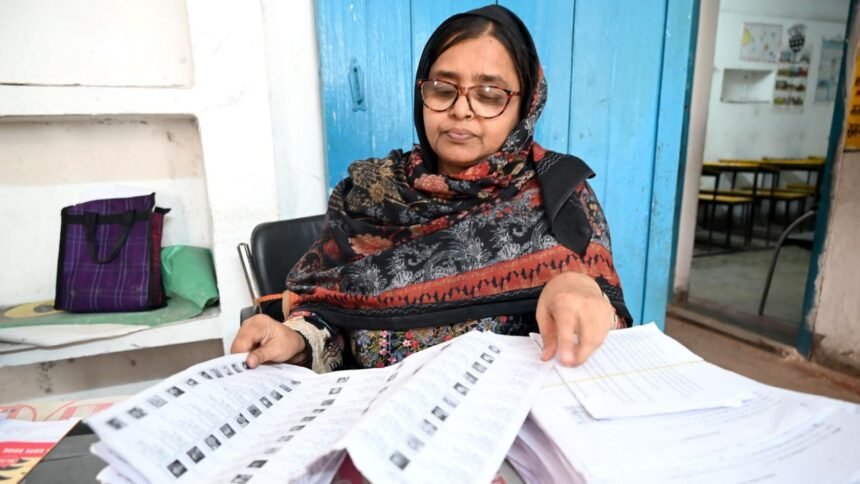Volunteers will be deployed to help electors get the documents required from government departments to meet the submission deadline of September 1 as part of the ongoing Special Intensive Revision (SIR) of electoral rolls in Bihar, the Election Commission said on Sunday.
The EC’s statement comes a day before the Supreme Court is set to hear a clutch of petitions challenging the SIR with opposition parties and civil society groups raising concerns over the potential disenfranchisement of existing electors. The court heard the matter first on July 10.
According to the EC, the first phase of the drive, which started on June 25, came to an end on July 26 with the enumeration forms of 7.23 crore out of 7.89 crore registered electors of the state having been received within the deadline. Around 65 lakh names would be removed from the rolls as the electors were found to have either died or migrated permanently or registered in more than one place or untraceable, the EC said.
In Sunday’s statement, the EC said 16 lakh forms had been filed online and over 13 lakh had been downloaded from its website and app.
According to the EC’s June 24 order, all electors of Bihar had to submit enumeration forms by July 25 to make it to the draft roll to be published on August 1. From August 1 to September 1, the electors would have to submit documents, from a list of 11 specified by the EC in its order, to establish their eligibility. These documents would then be scrutinised and the final roll published on September 30, as per the schedule.
For those on the 2003 electoral roll, when the last intensive revision was done, the EC order says the extract of the roll would do. The 11 documents include caste certificate, matriculation/ educational certificate, passport and birth certificate, but not the widely held Aadhaar, Voter ID and ration card.
“Entire election machinery and volunteers are making special efforts to assist any elector, especially senior citizens, PwD [persons with disabilities] electors, and other vulnerable groups, in obtaining their documents. Volunteers will connect with all electors so that their documents can be obtained from government departments with minimum efforts of the elector,” the EC said.
Story continues below this ad
It added that once the draft roll is published on August 1, any elector and political party would have the opportunity till September 1 to file claims and objections to include any eligible elector who has been left out and remove any ineligible elector on the rolls.
The EC said that no name can be deleted from the draft roll without notice to the elector and the relevant order passed by the Electoral Registration Officer (ERO) or Assistant ERO. “Any elector aggrieved by any decision of the ERO may appeal to the District Magistrate and the Chief Electoral Officer thereafter under Section 24 of the RP Act, 1950. Volunteers are also being trained in helping people to file appeals against any decision of ERO. A standard format for filing appeals is also being devised and will be widely circulated to allow people to file appeals easily,” the EC said.
The EC said 22 lakh electors were found to be deceased, 36 lakh had permanently shifted or were not found by the Booth Level Officers (BLOs) and 7 lakh were enrolled in multiple places.
“Exact status of these electors will be known after scrutiny of these forms by ERO/AERO by August 1, 2025. However, genuine electors can still be added back in electoral rolls during the claims and objection period from 1st August to 1st September 2025. The name of the electors found enrolled at multiple places in electoral rolls will be retained only at one place,” the EC said.
Story continues below this ad
The EC had announced its decision to hold a special intensive revision for the whole country on June 24, but started with Bihar as Assembly elections are due in the state by November.
Meanwhile, in its counter affidavit in the Supreme Court, the EC has defended its authority to verify the constitutional requirement of citizenship for those wanting to be enrolled as electors. The petitioners, including Association for Democratic Reforms, Yogendra Yadav, Arshad Ajmal and Rupesh Kumar, have submitted their responses to the EC affidavit.
Social activists Ajmal and Kumar have argued in their response that the SIR order is violative of the Representation of the People Act, 1950 and the Registration of Electors Rules, 1960. They contend that the SIR order prescribes a new declaration form and 11 documents, which are not a part of the rules. As per the rules, Form 6 is the prescribed form for new electors.
“It is submitted that the entire mechanism for the preparation, revision, and correction of electoral rolls must be traced to a valid statutory rule notified under Section 28 of the RP Act. Any material deviation from the procedure prescribed under the Rules constitutes executive overreach and is ultra vires the parent Act…It is therefore submitted that the introduction of a Declaration Form with rigid documentary preconditions via administrative fiat is ultra vires the RP Act, 1950 and 1960 Rules. The scheme for electoral inclusion is a matter statutorily encoded. The ECI cannot modify it unilaterally,” they said.
Story continues below this ad
They argued that the Act empowers the Central government to make rules and the EC’s SIR order was “a direct and unlawful usurpation of rule-making power vested exclusively in the Central Government under Section 28 of the RP Act.”







